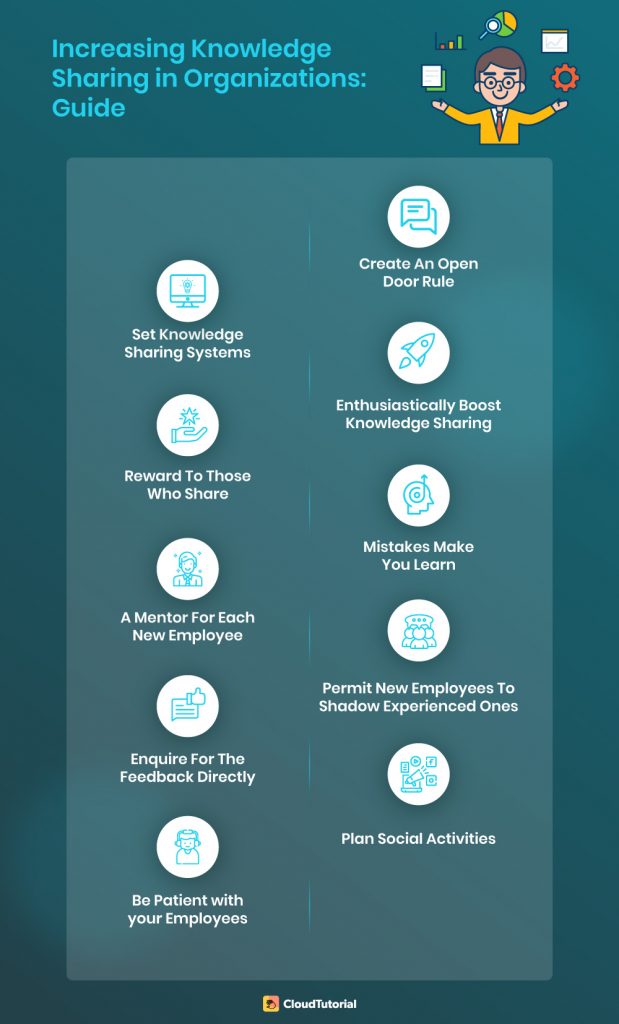“As corporate organizations get more digital and employees have access to a ton of information, the concept of knowledge sharing becomes critical.” – Source
Knowledge sharing is the procedure of conveying explicit and tacit knowledge from one individual to another. There are numerous noteworthy ways to increase knowledge sharing in organizations. In any business, sharing knowledge and data not only upsurges employee productivity but also authorizes workforces to do their tasks efficiently and effectively.
The most operative way your organization can get the advantage of knowledge sharing strategy is when you insert it within your organizational culture. Let’s observe what you can do to encourage knowledge sharing in your organization.
Table of Content
Why Knowledge Sharing Is Crucial In Organizations: Some Stats
Knowledge sharing is crucial for any company to attain success since it can simplify building learning organizations, decision-making capabilities, and stimulate innovation and cultural change.
As per research by Ivey Business Journal, the overall performance in a business increases just when teams do things differently. Below are some of the benefits describing why relevant knowledge sharing system is crucial in organizations:
-
Preserve Knowledge
In the present times, the employees tend to switch their jobs frequently. If such employees or colleagues do not share knowledge at the workplace effectively, their explicit knowledge and tacit knowledge would disappear as they leave the organization.
Often these individuals are long-standing executives and employees, with a treasure of matchless knowledge. If such knowledge resides within their minds only, the company’s collective knowledge will be diminished by their departure.
It has been projected that the cost to replace a member of the staff is more than $30,000. It results from the loss of efficiency in the 28 weeks it takes to take a recruit.
Want to share preserved files to new staff?
CloudTutorial offers an efficient knowledge sharing platform that stores and shares the vital projects.
-
Fosters Productivity And Innovation
Permitting teams to share knowledge properly and having that type of knowledge be accessible easily can aid your company to deliver improved results.
The spur of the knowledge management system and creativity assists the staff to be more creative, upsurges idea-sharing, and retains your company on the edge of new knowledge management strategies and trends.
-
Building More Experts
By distributing expert data and tacit knowledge, all the employees can develop their skills and feel self-confident in their knowledge. And when your company permits employees to access such important knowledge and information, you are making a team of professionals and experts who can display their skills in the project.
As per the findings from a global market intelligence firm, IDC, Fortune 500 enterprises lose around $31.5 billion yearly by failing to share the required relevant knowledge.
-
Deep Involvement
The knowledge sharing process makes sure that more employees or colleagues are involved with the data and information outside of their divisions. It inspires your staff to communicate openly with others, bond with executives, and feel more appreciated as a member.
Around 80% of Americans believe that employee communication is the key to building trust with their employers.
Your employees would like to feel like their ideas and knowledge matter. So, give them such chances to share those ideas, and thereby, you have a team that is more involved with their tasks and company.
-
Facilitate Better Decision Making
When the users are facing issues or you have to resolve an internal problem, plan new strategies, understand competition, or analyze trends, you tend to search for resources and information to support such events. But an information overload can make this procedure difficult.
Nevertheless, utilizing the knowledge management process permits decisions to be built on the real experiences of the members of your organization. All such jobs can be executed competently if it is easier to find what you require and, most significantly, when you require it.
-
Teamwork And Feedback
By presenting how significant the knowledge management system is to your organization, the workforce gets more open to cooperate and offer feedback between subdivisions. Rather than being unwilling to share thoughts or ideas, it keeps your business as an open community of information and knowledge.
Feedback is also vital because it permits everybody to express thoughts and be involved in a better conversation for the company’s benefit.
Benefits of Knowledge Sharing
Permitting employees to share knowledge is a thoughtful way to craft an environment in which they can improve their performance, and work more effectively. Such knowledge sharing activities have the following advantages for employees’ development as it lets them to share their views and can them a sense of belonging and satisfaction:
Enhance Delivery to Consumers
Customers favor a company that demonstrates its extensive expertise and the capability to utilize it to their benefit. Sharing its knowledge definitely reduces the time needed to deliver a service or a product, which results in augmented win rates and, certainly, pleased customers.
Open forum
A notable knowledge sharing scheme lets all voices be heard. This, in turn, enhances the overall culture of the organization. Moreover, it generates room for staff development and creativity.
Decrease The Loss of Know-how
Know-how is an imperative asset in an entire organization and it must be managed and exploited aptly. Through knowledge sharing, you can store explicit and tacit knowledge and ultimately, lessen their losses.
Make the Best Experiences Reusable
When you build an operative solution to a problem and it proves to be the best one, it sanctions employees to exercise it in all similar future circumstances. Eluding redundant efforts by administering knowledge appropriately, saves much time and budget. Moreover, it considerably streamlines the work and keeps employees’ spirits high.
Why Knowledge Sharing Is Not Natural For Some Organizations
One of the critical tasks of knowledge management is getting a person to share their knowledge openly. The teams can work smarter and faster by getting easy access to resources, expertise, and insights.
Below is the list of reasons stating why knowledge sharing is not natural for some organizations:
- The departments do not understand the importance of effective knowledge sharing activities
- One of the human factors is that employees or colleagues do not trust each other
- The employees do not have much time
- Most of the employees do not have a proper understanding of knowledge management
- There is no apt reward system for sharing the information
- Employees do not wish to share knowledge or experience as they think ‘knowledge is power’
- The staff assume that they are adopting the right way to share information
- They do not see any positive consequence for sharing knowledge
- Certain challenges are beyond their control
Encourage Knowledge Sharing In Organizations: The 10 Step Guide

All the companies do have their cultures. These are the values and rules that fix the standards for their knowledge workers or members and observe their behavior. In knowledge sharing organizational learning, a collaboration between workforces is a routine. You can reap the benefits from team cooperation by encouraging effective knowledge sharing systems in companies. Below are the vital steps to follow:
You can reap the benefits from the team cooperation by encouraging effective knowledge sharing systems in companies. Below are the vital steps to follow:
-
Create An Open Door Rule
An organization would not have open communication without a proper ambiance of trust. The team must be able to feel that they can approach anybody in the organization to ask queries or find out data at any time.
-
Set Knowledge Sharing System
Do you and your team lose much time trying to discover valuable data? Do you have trouble sharing knowledge within your organization?
Then you are required to re-examine the knowledge management system you are employing. The apt program will be able to reorganize the kinds of functions you use daily. CloudTutorial provides an efficient knowledge sharing platform that improves your culture of sharing and keeping your folders, files, e-mails organized.
-
Enthusiastically Facilitate Knowledge Sharing
The workplace runs on co-operation. You must make time for your employees to collaborate directly. You should share your content with your employees frequently.
It is crucial to share their knowledge from the top-down approach so that the employees can view that the management is embracing the notion of teamwork and generating a knowledge-sharing culture.
-
Reward To Those Who Share
As you know, functioning in a culture of knowledge transfer does not arrive naturally. You can give your team of employees an incentive or implement certain reward systems to share relevant information or have discussions about what they know within the departments.
-
Mistakes Make You Learn
To make an atmosphere where the workforce share ideas easily and collaborate without holding back, they require to know that creating mistakes is normal. It is just the way that can make people learn. So, focus on what the company and team can learn from blunders while moving forward.
-
A Mentor For Each New Employee
A mentor is a person the newly hired employee can go to at any point of time with concerns or questions. This person is not your employee’s immediate manager, who will judge and doubt while the employee is trying to fit in. Such a mentor sets good examples and inspires the new hire to express and do not hesitate to begin contributing immediately.
-
Permit New Employees To Shadow Experienced Ones
You can arrange a plan for your new employees to shadow their fellow team members for some days. When these new employees observe how experienced members handle sharing their opinions with other departments, she or he will feel comfortable about accepting a similar work pattern.
-
Enquire For The Feedback Directly
The best method to examine what your colleagues or employees are thinking is to inquire directly. Such questioning may seem to be uncomfortable at first, but as time passes enquiring or providing feedback will turn into a communally valuable cooperative network soon.
-
Plan Social Activities
You can schedule some events in which your team of knowledge workers can take part after work or on the weekend. In this way, your staff can spend time together in casual environments. In such an arrangement, they can get to know each other in a better way which in turn, will aid in company performance.
-
Be Patient with your Employees
If you are forming knowledge about organizational culture as a new strategy, it will take some time for your team to adapt and adjust. Individuals who have been used to a different way of functioning will be required to amend their thoughts around how co-workers are supposed to network with each other.

Need to introduce new strategies in your culture?
CloudTutorial facilitates you to capture and share every new strategy within your teams.
Verdict
Knowledge management systems have become enormously important to companies and employees. It can also make a big difference in your business’s performance, collaboration, growth, productivity, and brand.
Dispersing valuable knowledge not only retains your employees up-to-date but also affects the external audience’s opinion of your employees and company. Having a team of experts will assist your company to upgrade and stay ahead of the prevailing completion in the market.
From the above-mentioned ways to increase knowledge sharing, we can see that your company can quickly and easily search content, locate experts, ask questions, streamline the training and onboarding process, encourage everyone from interns to CEOs to contribute ideas, and store documents and videos.
Contact CloudTutorial for implementing a robust knowledge-sharing platform that will allow team members to share ideas, stay aligned, and collaborate around the same data even when they are not operating in the same workspace.
Try it out before you decide.
Create a test article NOW!
Using this tool, all you have to do is add your first test article and see how it looks. Now, you don’t have to sign-up or login into CloudTutorial software just to check how your first article appears.


